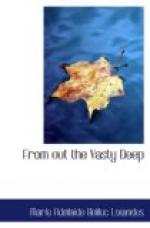Pegler drew a long breath. Then she went on again: “I sat down just for a minute or two, and I turned over queer—so queer, ma’am, that I went and drew the curtains of one of the windows. Of course it’s a much bigger room than I’m generally accustomed to occupy, as you know, ma’am. And I just threw up the window—it’s what they call a guillotine window—and there I saw the water, you know, ma’am, in what they call the moat—”
“Yes,” said Miss Farrow languidly. “Yes, Pegler, go on.”
“As I looked down, ma’am, I had an awful turn. There seemed to me to be something floating about in the water, a little narrow thing like a child’s body—and—and all on a sudden a small white face seemed to look up into mine! Oh, it was ’orrible!” Pegler did not often drop an aitch, but when she did so forget herself, she did it thoroughly.
“As I went on looking, fascinated-like”—she was speaking very slowly now—“whatever was down there seemed to melt away. I didn’t say nothing that evening of what had happened to me, but I couldn’t keep myself from thinking of it. Well, then, ma’am, as you know, I came and undressed you, and I asked you if you’d like the door kept open between our two rooms. But you said no, ma’am, you’d rather it was shut. So then I went to bed.”
“And you say—you admit, Pegler—that nothing did happen the night before last?”
Pegler hesitated. “Nothing happened exactly,” she said. “But I had the most awful feeling, ma’am. And yes—well, something did happen! I heard a kind of rustling in the room. It would leave off for a time, and, then begin again. I tried to put it down to a mouse or a rat—or something of that sort.”
“That,” said Miss Farrow quietly, “was probably what it was, Pegler.”
As if she had not heard her lady’s remark, the maid went on: “I’d go off to sleep, and then suddenly, I’d awake and hear this peculiar rustle, ma’am, like a dress swishing along—an old-fashioned, rich, soft silk, such as ladies wore in the old days, when I was a child. But that dress, the dress I heard rustling, ma’am, was a bit older than that.”
“What do you mean, Pegler?”
The maid remained silent, her eyes were fixed; it was as if she had forgotten where she was.
“And what exactly happened last night?”
“Last night,” said Pegler, drawing a long breath, “last night, ma’am—I know you won’t believe me—but I saw the spirit!”
Miss Farrow looked up into the woman’s face with an anxious, searching glance.
She felt disturbed and worried. A great deal of her material comfort—almost, she might have truly said, much of her happiness in life—depended on Jane Pegler. In a sense Blanche Farrow had but two close friends in the world—her host, Lionel Varick, the new owner of Wyndfell Hall; and the plain, spare, elderly woman standing now before her. She realized with a sharp pang of concern what Pegler’s mental defection would mean to her. It would be dreadful, dreadful, if Pegler began seeing ghosts, and turning hysterical.




